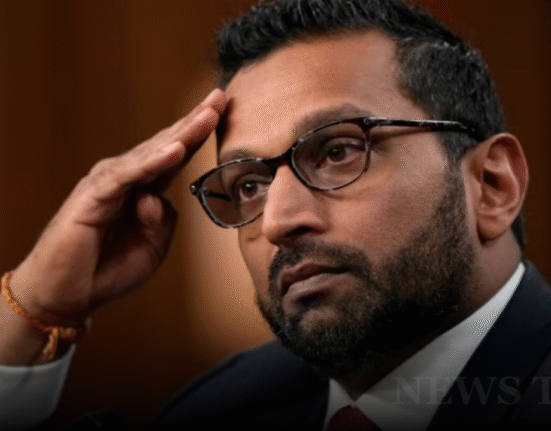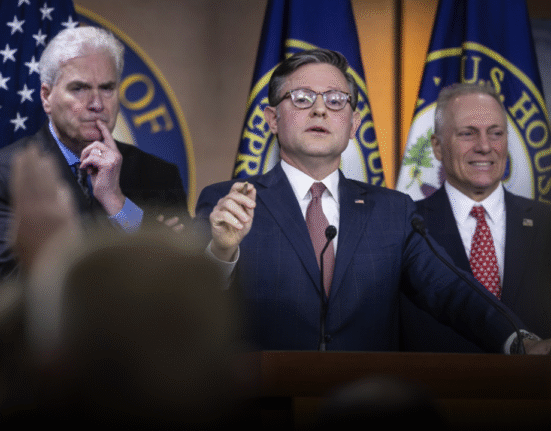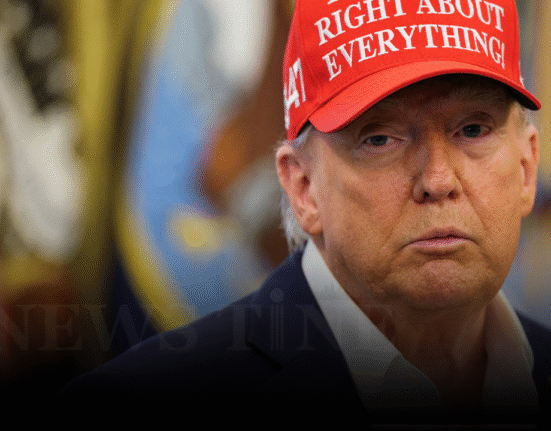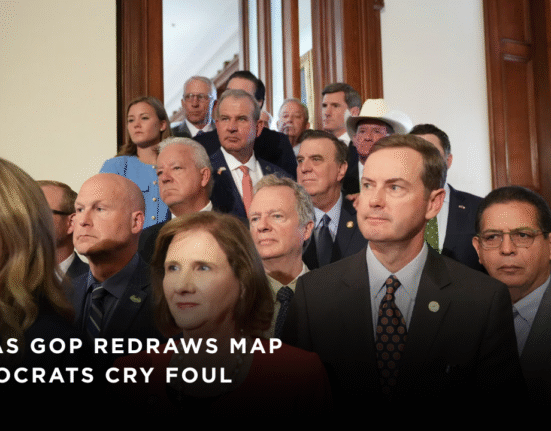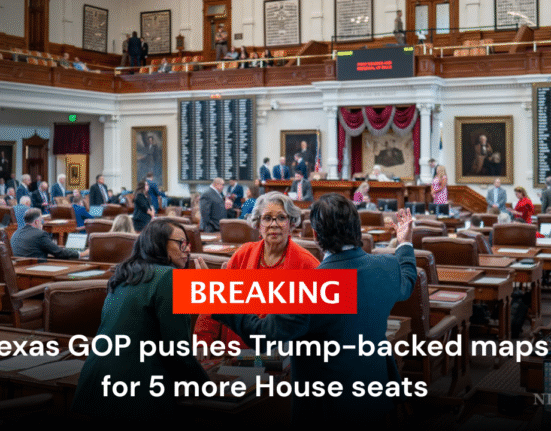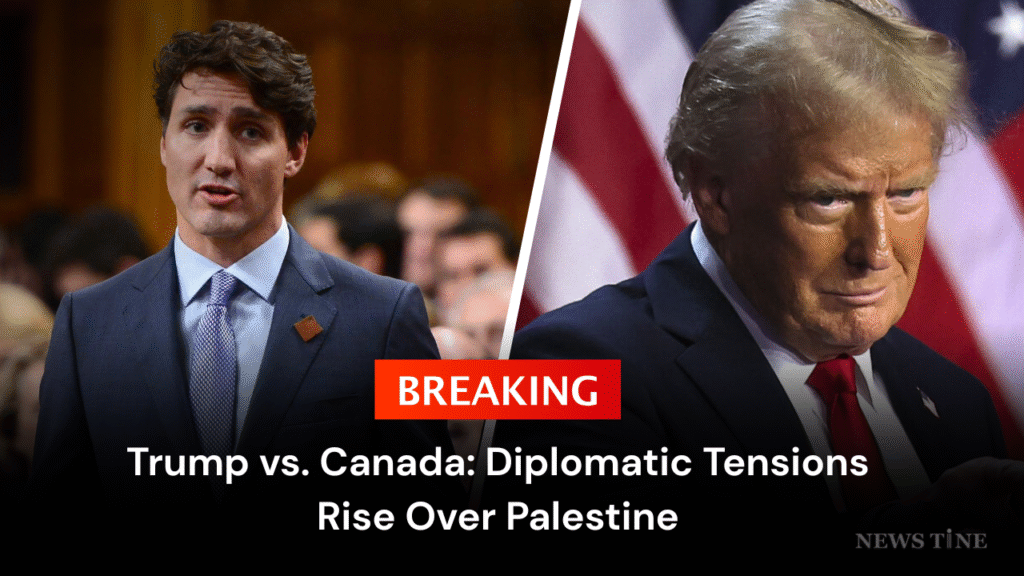
Introduction: Trump Leverages Canadian Diplomacy in Trade Talks
In a world where geopolitics increasingly shapes economics, President Donald Trump has once again blurred the lines between foreign policy and trade. This time, the focus is on America’s northern neighbor. Trump has warned that Canada’s decision to recognize a Palestinian state could severely hinder any progress in ongoing trade negotiations. The move comes amid rising global momentum in favor of Palestinian statehood and mounting frustration over Israel’s prolonged military operations in Gaza.
The former president, who has frequently used tariffs as a diplomatic sledgehammer, posted on his Truth Social platform that Canada’s stance would “make it very hard” to strike a new trade agreement. It’s not just policy; it’s personal, political, and packed with ramifications.
Canada’s Recognition of Palestine: A Tectonic Shift
Why Is Canada Recognizing Palestine Now?
Canadian Prime Minister Mark Carney’s announcement that Canada will formally recognize a Palestinian state in September marks a significant shift in North American diplomacy. It aligns with growing international support for Palestinian autonomy, especially as global patience with Israel’s policies in Gaza wears thin.
- Canada joins the UK and France in recognizing Palestinian statehood.
- The decision is scheduled to take effect just weeks before the UN General Assembly.
- Carney stated it was “time for Canada to stand on the right side of history.”
This isn’t just symbolic. It’s diplomatic currency, and Trump appears ready to devalue it.
Trump Responds with Tariff Threats
The Truth Social Post That Sparked It All
Trump’s early morning post read:
“Wow! Canada has just announced that it is backing statehood for Palestine. That will make it very hard for us to make a Trade Deal with them. Oh’ Canada!!!”
His trademark sarcasm aside, Trump’s threat underscores his pattern of linking unrelated policy domains — in this case, foreign diplomacy and economic negotiations.
A Pattern of Political Tariff Use
This isn’t Trump’s first rodeo. Here are a few instances where he used tariffs to achieve unrelated political goals:
- Brazil: Threatened tariffs after Jair Bolsonaro was indicted.
- China: Used tariffs to pressure Beijing on fentanyl trafficking.
- Mexico: Tariffs over immigration enforcement.
In all cases, economic tools were used as leverage for political outcomes.
What This Means for US-Canada Trade
The Current Trade Landscape
- The United States-Mexico-Canada Agreement (USMCA), enacted in 2020, still governs many trade aspects.
- However, USMCA is up for renegotiation in 2026, making now a critical window for pre-negotiation posturing.
- Trump has already floated a 35% tariff on Canadian goods if no deal is reached by Friday.
Possible Implications for Consumers and Industries
| Sector | Potential Impact |
|---|---|
| Agriculture | Higher food prices due to increased import costs |
| Automotive | Delays in cross-border parts shipments |
| Retail | Increased prices on Canadian goods like lumber, clothing |
This uncertainty could rattle markets, especially sectors with heavy US-Canada integration.
International Reactions: Mixed But Cautious
France and the UK
Interestingly, Trump expressed indifference when the UK and France announced similar recognitions.
“It’s not going to change anything,” Trump said about Macron’s stance.
So why the tough talk on Canada?
Experts say it might stem from his long-running critique of Canadian policies, occasionally joking that Canada should become “the 51st state.”
United Nations
A recent UN conference urged Israel to support Palestinian statehood, citing humanitarian concerns and the need for a two-state solution.
International pressure is mounting, and Canada’s move is part of a broader wave.
The Politics Behind the Trade Talk
A Trade War or a Political Statement?
While tariffs and trade negotiations are typically driven by economics, Trump’s actions suggest deeper motivations:
- Support for Israel: Trump has long stood by Netanyahu and Israeli sovereignty.
- Domestic Politics: With the 2026 midterms approaching, playing hardball with Canada may boost his nationalist credentials.
- Global Alliances: Sending a message to other allies considering similar diplomatic moves.
In short, the trade war may not be about trade at all.
What Carney Had to Say
Prime Minister Carney has yet to respond directly to Trump’s threats but emphasized Canada’s commitment to peace and international law:
“We are choosing to act on our values, not on fear.”
A subtle jab, perhaps, but a powerful one.
Where Do We Go From Here?
Trump’s latest stance adds a new layer of complexity to an already tangled web of trade and diplomacy. While Canada moves forward with its recognition of Palestine, the U.S. appears to be drawing lines that could impact everything from tariffs to long-standing alliances.
As always, the biggest losers could be everyday citizens — Canadian exporters, American consumers, and the global community hoping for a stable and fair resolution to the Israel-Palestine conflict.


